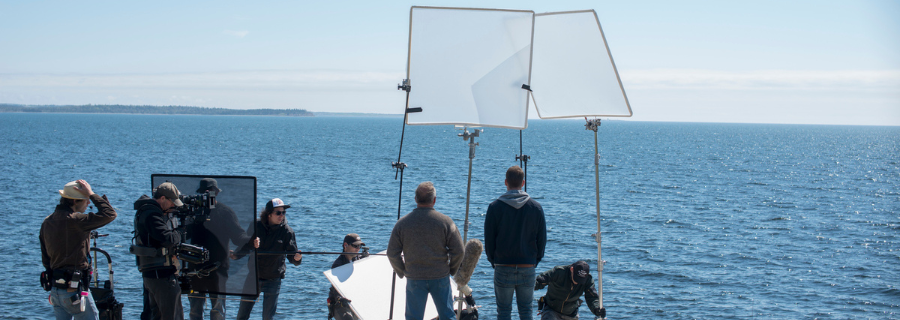This past March, the provincial government announced $23 million in funding to support Nova Scotia’s film and television industry, which contributed over $180 million to the local economy last year — more than double from the year prior.
What has led to such rapid growth in Nova Scotia’s film and television industry, and how can we keep the momentum going? We spoke with Screen Nova Scotia, Mirror Image Media, and Popular Demand Pictures for insight.

On the set for The Healer (2017), which filmed on location across Nova Scotia.
Screen Nova Scotia
Screen Nova Scotia is a not-for-profit association that promotes and advocates for our local screen industry. If you’re planning on producing a movie or tv show in the province, Screen Nova Scotia is your first point of contact, according to Tara McClair (Operations & Communications Manager) and Melanie Solomon (Industry Services & Locations Manager). “Our membership includes producers, service providers, local cast and crew, unions, and industry organizations,” says McClair. “We are dedicated to building a strong and sustainable future for the province’s production sector.”
McClair and Solomon point out that as our film industry grows, so too does its impact. “A thriving film industry strengthens Nova Scotia, both economically and culturally,” says McClair. “When producers spend their production dollars here, it injects money right back into the local economy.”
Beyond the economic impact, the industry works to uplift voices from all walks of life. “Culturally, the screen industry in Nova Scotia is working to tell important and diverse stories,” says McClair. “While there are many big-budget US productions that choose to film in the province, there are also local storytellers in our writers, directors and producers that are getting their projects made — putting our culture onto screens both nationally and internationally.”
What makes Nova Scotia such an attractive place to produce? First, location is key. “Our province has been an in-demand location for regional and international filmmakers for decades,” says McClair. “Whether a production requires downtown urban sophistication, small-town ambience, or miles of unspoiled coastline, we have it all right here!”
Second, local support is unparalleled. “The communities and residents of Nova Scotia are enthusiastic and excited to see production happening in the province,” says McClair. “Trust us, this is noticed and appreciated by visiting producers, directors, and cast!”
Third, the financial incentives and funding opportunities are some of the most competitive in the country. Lastly, our industry professionals are exceptional. “Our world-class crew and talent love what they do, and it shows in the quality of the work on screen,” says McClair. “We've heard from several large-scale productions that our Nova Scotia crew are among the best they've ever worked with.”
McClair and Solomon highlight a number of recent Nova Scotia productions. Diggstown made history when Halifax director, Juanita Peters, became the first Black woman in Nova Scotia to direct an hour of primetime drama for a network series. Wildhood is a feature film by Two-Spirit L'nu filmmaker Bretten Hannam and was recently nominated for six Canadian Screen Awards. Washington Black, an adaptation of Esi Edugyan’s novel and Disney/Hulu production, is filming right now in locations across the province.
What’s on the horizon for Screen Nova Scotia? In addition to their robust slate of programs and events, they recently launched their Diversity Mentorship Program — a paid mentorship opportunity for emerging professionals representing a diverse array of communities. “The opportunities at Screen Nova Scotia are always growing and expanding,” says McClair. Be sure to visit their website and sign up for their newsletter to keep informed!

Marie and Meaghan Wright on set for Living in Flow (2021), a six-part documentary series for Vice (Image credit: Carolina Andrade).
Mirror Image Media
Mirror Image Media is a full-service video production company based in Halifax. The founders — twin sisters Marie and Meaghan Wright — create commercials, branded content, and documentaries with a focus on social and environmental impact.
The Wrights first got their start when they began documenting their travels backpacking through New Zealand. While working toward their business degrees, they were hired to create promotional content for St. Francis Xavier University. “We were drawn to more impactful storytelling and worked with various organizations and initiatives on campus,” they say.
They worked with Get REAL, which strives to eliminate homophobia and transphobia, as well as the Canadian Cancer Society’s Relay for Life. “We lost our mom to cancer when we were 14,” the Wrights say. “We attribute that to our urge to bring more meaningful stories and marginalized voices to the forefront through film.”
Their personal perspectives continue to influence their work, according to the Wrights. “We’re lucky to have each other, both professionally and personally,” they say. “We’re two young, vibrant queer women, and our goal is to push the boundaries of what is portrayed in media — as well as who brings these stories to life.”
Regardless of the project, the Wrights are united in their thoughtful and sensitive approach. “We’re always asking how we can we make a production more inclusive and change the narrative on projects we’re working on,” they say. “Media is more saturated than ever, and our goal is to create an impact.”
Being able to generate an impact is one of the main perks of the profession to the sisters. “The film industry is an integral and influential part of every community, not only because it employs folks and creates jobs, but because it has the potential to educate and inspire people,” they say. “For us, it’s been a great opportunity to combine our passion for creativity with our sense of entrepreneurship.”
Producing in Nova Scotia has many benefits for the Wrights. “We’re lucky to live and work in ‘Canada’s Ocean Playground,’” they say. “Having access to so much beauty in this province is a gift when it comes to filmmaking.” They also appreciate the supportive and enthusiastic community, as well as the natural sources of inspiration. “There’s a plethora of impactful stories to tell, whether that be from individuals, programs, or organizations,” they say.
The pair have been keeping busy with multiple projects on the go. Be sure to check out Living in Flow, their six-part documentary series for Vice and TelusFund that focuses on the mental health healing powers of water. Login to CBC Gem to watch their feature film, Freedom Swell, which recently took home Best Documentary Film at the 2022 Screen Nova Scotia Awards!

Jon Mann and the Popular Demand team on the set of Pub Crawl, a docuseries that tells Halifax history through local bars and restaurants.
Popular Demand Pictures
Like the duo behind Mirror Image Media, Jon Mann, the creator behind Popular Demand Pictures, is driven by the power of storytelling. “I founded Popular Demand Pictures in 2012, between graduating from Acadia University and the New York Film Academy,” says Mann. “I wanted to create a production company that focused on telling authentic, meaningful, and purpose-driven stories.”
Mann first found notoriety after writing a short documentary called Drink ‘Em Dry, which chronicled the lockout of 172 brewery workers at Moosehead in 2011. He went on to complete his first feature-length documentary titled Project Power, which followed the social movement against the sale of NB Power to Hydro-Québec.
Mann has since expanded into television and commercial work, most recently creating the Pub Crawl series for Bell. “Pub Crawl is an unscripted series that tells the history of Halifax through the lens of its bars and restaurants,” says Mann. “Our second season went live in March.” You can catch the series on the Bell Fibe TV Channel and the Fibe TV app.
Producing a film is a tough job says Mann, but it also creates so many other jobs along with it. “Even the smallest production can provide jobs for over ten people,” says Mann. “It offers a diversity of employment and drives tourism to destinations that become iconic features in productions.”
Mann points out the versatility of Nova Scotia’s landscapes. “We have the scenic and cultural aspects that everyone wants to capture,” says Mann. “Look at the roles Halifax has played. Our city has been small town Maine, our waterfront has played Miami – and I’m pretty sure Lunenburg has played every state in New England.”
The industry also attracts students to the area — and helps keep them here. “Having films produced in Halifax means that those graduating from our local colleges and universities have opportunities to put their skills into action,” says Mann. “We have some of the most incredible creative programs, and we need people to feel like this city offers them opportunities.”
The increased level of government funding will allow for larger productions in Nova Scotia, notes Mann. This increase won’t just help the economy; it will also strengthen and diversify our cultural capital. “Creators want to be in Halifax,” says Mann. “The strong quality of life and social fabric in Nova Scotia exists because of the culture shared by our most creative people. The film industry is another vehicle that needs to be taken seriously as an opportunity to leverage what this province has to offer. It’s good business.”
< Back to Articles | Topics: Spotlight

